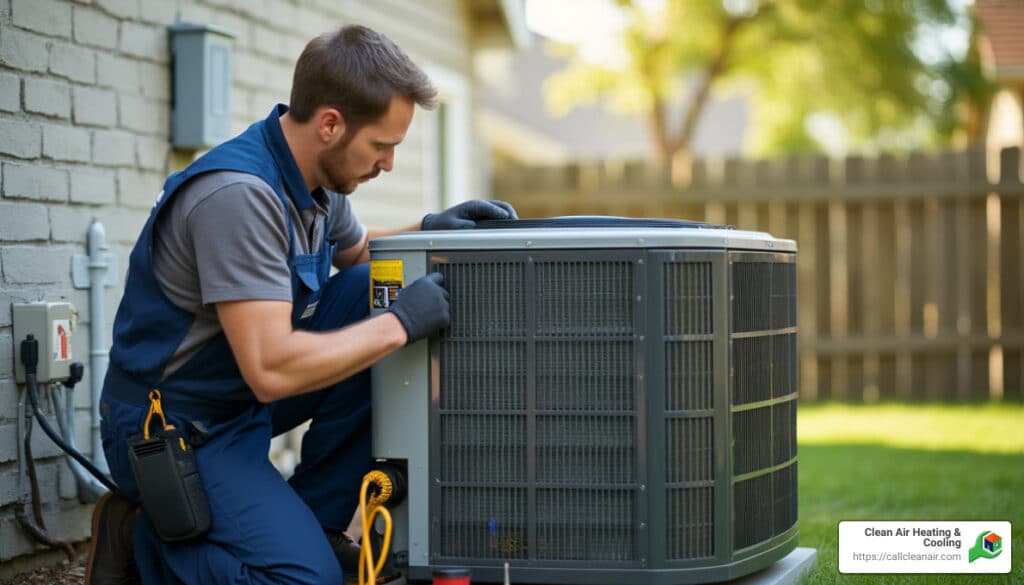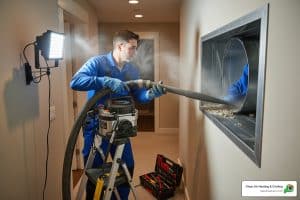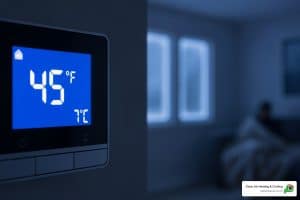Residential AC maintenance is crucial for keeping your home cool, comfortable, and energy-efficient. Regular attention to your air conditioning unit can extend its lifespan, improve air quality, and save you money on energy bills. Here are the key benefits:
- Extended lifespan: Regular maintenance prevents costly early replacements.
- Improved efficiency: Keeps the system running smoothly and economically.
- Better health: Clean units reduce allergens and pathogens.
By prioritizing air conditioning upkeep, you ensure a comfortable and healthy living environment, making those scorching summer days much more bearable. Moreover, a well-maintained system runs efficiently, helping you avoid unexpected breakdowns when you need it most.
My name is Colin Matei, and I bring experience in residential AC maintenance as the Owner and President of Clean Air Heating & Cooling in Northwest Washington. My passion is to improve the comfort and well-being of our community, ensuring your HVAC systems are reliable and efficient.

Essential Residential AC Maintenance Tasks
Maintaining your air conditioning unit is not just about comfort—it’s about efficiency and longevity. Here are the essential tasks you should focus on to keep your AC in top shape.
Changing Filters
One of the simplest yet most effective tasks in residential AC maintenance is changing the air filters. Filters trap dust, pollen, and other particles, improving air quality and preventing them from clogging your system.
- When to change: Every 90 days, or more frequently if you have pets or allergies.
- Benefits: Clean filters improve airflow, reduce energy consumption, and improve indoor air quality.
Cleaning Coils
Your AC’s evaporator and condenser coils collect dirt over time, reducing their ability to absorb heat. Cleaning these coils is crucial for efficient cooling.
- How to clean: Gently brush off dirt and debris. For tougher grime, use a coil cleaner.
- Frequency: Annually, or more often in dusty environments.
Clearing Debris
Debris around your outdoor AC unit can obstruct airflow and reduce efficiency. It’s important to keep the area clear.
- What to do: Remove leaves, dirt, and any obstructions from around the unit.
- Why it matters: Ensures proper airflow and prevents overheating.
Checking Refrigerant Levels
Refrigerant is key to your AC’s cooling process. Incorrect levels can lead to inefficiency or damage.
- How to check: Use a pressure gauge on the refrigerant lines.
- When to hire a pro: If levels are off, a professional should handle adjustments to ensure safety and compliance.

By focusing on these essential tasks, you can keep your air conditioner running smoothly and efficiently, ensuring comfort in your home all summer long. Regular maintenance is an investment in your home’s comfort and your system’s longevity.
DIY vs. Professional Maintenance
When it comes to residential AC maintenance, homeowners have a choice between do-it-yourself (DIY) methods and hiring professional services. Each approach has its benefits and limitations, and knowing when to call in the experts can save you time and money.
DIY Methods
DIY maintenance can be a cost-effective way to keep your AC unit in good shape. Here are some tasks you can handle on your own:
- Change Air Filters: As mentioned earlier, replacing air filters every 90 days is a simple task that can significantly improve air quality and system efficiency.
- Clean Coils and Fins: Use a soft brush or vacuum to remove dust from the evaporator and condenser coils. Straighten any bent coil fins with a fin comb to improve airflow.
- Clear Debris: Regularly inspect and clear leaves, dirt, and other debris from around the outdoor unit to prevent airflow obstruction.
- Unclog Drain Lines: Use a wet/dry vacuum to clear any blockages in the condensate drain line, preventing water damage and mold growth.
While these tasks are manageable for most homeowners, always ensure the power is off before performing any maintenance to avoid accidents.
Professional Services
Hiring a professional HVAC technician brings expertise and peace of mind. Professionals have the tools and knowledge to address complex issues that DIY methods can’t handle:
- Refrigerant Levels: Checking and adjusting refrigerant levels require specialized equipment and expertise to ensure safety and compliance.
- Comprehensive Inspections: Technicians can perform thorough system checks, identifying issues that might not be visible to the untrained eye.
- Advanced Repairs: Problems like electrical issues, motor failures, or mold growth should always be handled by professionals to avoid further damage.

When to Hire a Professional
Knowing when to call a professional can prevent minor issues from becoming major problems. Consider professional help if you notice:
- Warm Air: If your unit is blowing warm air despite DIY efforts, it might need a more in-depth inspection.
- Unusual Noises: Strange sounds could indicate mechanical issues that require expert attention.
- Leaks: Water or refrigerant leaks are serious and should be addressed by a professional immediately.
- Poor Airflow: Persistent airflow problems might suggest ductwork issues or a failing component.
By balancing DIY efforts with professional services, you can ensure your AC unit operates efficiently and lasts longer. This approach not only saves money but also improves comfort and safety in your home.
Next, let’s explore how often you should service your AC to keep it in optimal condition.
How Often Should You Service Your AC?
Regular maintenance is key to keeping your AC running smoothly. Experts recommend servicing your AC twice yearly—once in the spring and once in the fall. This schedule helps prepare your system for heavy use in the summer and ensures it’s ready for any heating needs in the winter.
Seasonal Maintenance
Spring and fall are the ideal times for seasonal maintenance. In the spring, focus on getting your AC ready for the warmer months. Check the refrigerant levels, clean or replace filters, and ensure the outdoor unit is free of debris. In the fall, it’s time to prepare your system for any heating requirements and to address any issues that arose during the summer.
Recommended Schedule
Following a recommended schedule not only keeps your AC in top condition but also extends its lifespan. Here’s a simple timeline:
- Spring: Perform a comprehensive check-up. Clean coils, change filters, and inspect the refrigerant levels. This is also a good time to schedule a professional inspection to catch any issues early.
- Summer: Keep an eye on performance. Monitor the thermostat settings and ensure the unit is cooling efficiently. Regularly clear debris from around the outdoor unit.
- Fall: Focus on cleaning and minor repairs. Replace the air filters again and check for any signs of wear or damage that might have occurred over the summer.
- Winter: If your AC doubles as a heating unit, ensure it’s operating correctly. Otherwise, cover the outdoor unit to protect it from harsh weather conditions.
By adhering to this schedule, you can help your AC perform at its best, reduce the risk of unexpected breakdowns, and maintain energy efficiency. Regular maintenance not only saves you money on energy bills but also minimizes the need for costly repairs.
In the next section, we’ll discuss the signs that your AC needs maintenance, so you know when it’s time to take action.
Signs Your AC Needs Maintenance
Knowing when your AC needs attention can save you from discomfort and costly repairs. Here are some key signs that your system might need maintenance:
Warm Air
If your AC is blowing warm air instead of cool, it’s a clear sign that something is wrong. This issue can stem from a malfunctioning compressor, a refrigerant leak, or a clogged air filter. Addressing this promptly can prevent further damage and keep your home comfortable.
Unusual Noises
Strange noises like rattling, banging, or buzzing coming from your AC unit are not normal. These sounds often indicate loose parts, debris in the system, or problems with the motor. Ignoring these noises can lead to more severe issues, so it’s best to have a professional take a look.
Leaks
Visible leaks or moisture around your AC unit are red flags. These can be caused by a clogged condensate drain or a refrigerant leak. Not only do leaks reduce efficiency, but they can also lead to water damage and mold growth, which can impact your indoor air quality.
Poor Airflow
Weak or insufficient airflow is a common sign of an AC problem. This could be due to blocked vents, a failing blower motor, or leaky ductwork. Poor airflow not only makes your AC work harder but also compromises your comfort. Having an HVAC specialist inspect your system can resolve these issues and improve performance.
Recognizing these signs early can help you maintain your AC system’s efficiency and extend its lifespan. In the next section, we’ll address frequently asked questions about residential AC maintenance to further guide you in keeping your system in top shape.
Frequently Asked Questions about Residential AC Maintenance
How often should AC filters be replaced?
Replacing your AC filters regularly is crucial for maintaining optimal indoor air quality and system efficiency. Every 90 days is the general recommendation for changing filters. However, if you have pets or suffer from allergies, it’s wise to replace them more frequently, perhaps every 1-2 months. This helps capture pet hair, dander, and allergens, ensuring clean air circulates in your home.
What are the signs of a broken AC?
Identifying the signs of a broken AC early can prevent more significant issues. Here are some common indicators:
- Warm Air: If your AC blows warm air, it may be due to a refrigerant leak or a malfunctioning compressor.
- High Electricity Bills: A sudden spike in your energy bills could signal that your AC is working harder than usual, possibly due to inefficiencies or faults.
- Unusual Noises: Sounds like rattling, buzzing, or banging could mean loose parts or motor issues.
Recognizing these signs can help you address problems promptly, saving you from costly repairs.
How do I check the Freon in my air conditioner?
Checking the Freon (refrigerant) levels in your air conditioner is an important maintenance task. To do this, follow these steps:
- Turn Off the Unit: Ensure your AC is off before proceeding.
- Locate the Pressure Gauge: Find the pressure gauge on the side of the unit.
- Inspect Refrigerant Lines: Check the lines for any visible signs of leaks or damage.
It’s essential to handle refrigerant with care and consider hiring a professional if you’re unsure about the process. Proper refrigerant levels are vital for efficient cooling and system longevity.
By regularly maintaining your AC and understanding these common issues, you can ensure your system runs smoothly and efficiently. In the next section, we’ll explore the differences between DIY and professional maintenance to help you decide the best approach for your needs.
Conclusion
At Clean Air Heating & Cooling, our mission is simple: to keep your home comfortable while maximizing energy efficiency. We understand that residential AC maintenance is key to achieving these goals. By ensuring your air conditioning system is well-maintained, you not only enjoy a cool and comfortable home but also benefit from increased energy savings.
Our commitment to customer satisfaction is evident in our 480+ five-star Google reviews. We prioritize prompt, high-quality service, and we stand by our 25% utility savings guarantee. This means that when you choose us for your AC maintenance needs, you’re choosing a company that values your comfort and your wallet.
Regular maintenance is crucial for preventing unexpected breakdowns and extending the lifespan of your AC unit. By keeping up with routine tasks like changing filters, cleaning coils, and checking refrigerant levels, you can ensure your system operates efficiently all year round.
We proudly serve the communities of Bellingham, Whatcom, Skagit, Snohomish, San Juan, and Island Counties. If you’re ready to experience the benefits of a well-maintained AC system, contact us today for all your residential AC maintenance needs. Our expert technicians are here to help you achieve a more comfortable and energy-efficient home.





